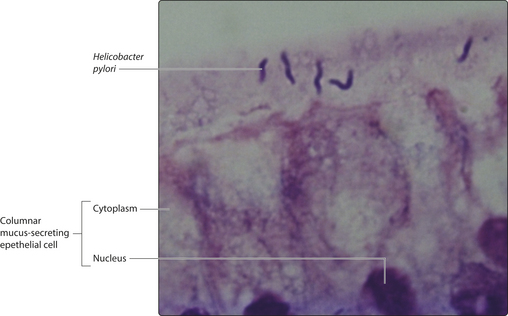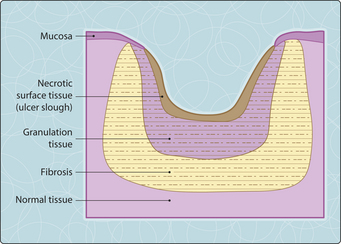Chapter 47 Gastritis and peptic ulcer disease
Peptic ulceration is defined as a breach in the mucosa (i.e. full-thickness loss) of the gastrointestinal tract caused by the action of acidic gastric juice. Peptic ulcers can be acute or chronic, although sometimes the term peptic ulcer is confined to the chronic variety (Fig. 3.47.1). Some types of inflammation of the stomach (gastritis) are especially associated with peptic ulcer formation, and these are discussed in this chapter.
Gastritis
Acute gastritis
The principal causes of acute gastritis are:
 NSAIDs: cause reduced prostaglandin synthesis in the gastric mucosa, leading to exfoliation of surface epithelial cells and inhibition of mucus secretion, thus reducing mucosal defences against acid attack
NSAIDs: cause reduced prostaglandin synthesis in the gastric mucosa, leading to exfoliation of surface epithelial cells and inhibition of mucus secretion, thus reducing mucosal defences against acid attack stress (e.g. severe burns, major trauma): associated with gastric inflammation, erosion and ulceration, possibly as a result of mucosal ischaemia
stress (e.g. severe burns, major trauma): associated with gastric inflammation, erosion and ulceration, possibly as a result of mucosal ischaemiaChronic gastritis
Although H. pylori does not invade the tissues, it lives in the surface mucus of gastric mucosa (Fig. 3.47.2) where it secretes a number of toxins that damage surface epithelial cells and break down the mucus barrier. When first acquired, this organism produces a transient acute gastritis, but this is self-limiting and often produces no symptoms. Some individuals mount an effective defence and eliminate the organism. Many individuals do not clear the organism, however, and a chronic carrier state develops. This carrier state is associated with chronic inflammation of the mucosa driven by a Th1 immune response, the severity of the inflammation depending on the strain of the infecting organism. As a result, patients may either have abdominal symptoms or be asymptomatic. The most common serious sequela of H. pylori infection is peptic ulceration.

Fig. 3.47.2 Helicobacter pylori in the surface mucus of the stomach. Modified Giemsa stain, oil immersion lens.
Stay updated, free articles. Join our Telegram channel

Full access? Get Clinical Tree












